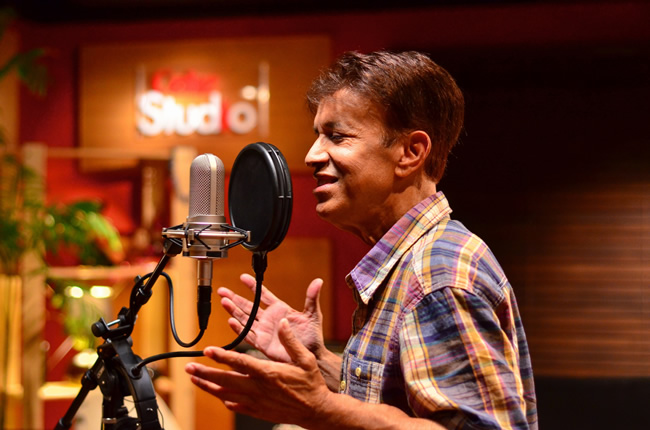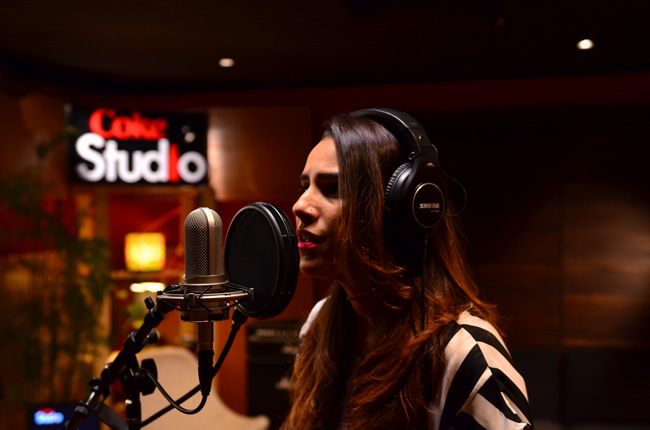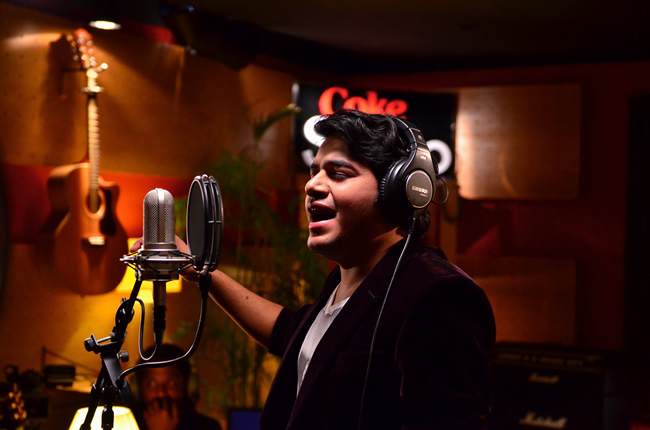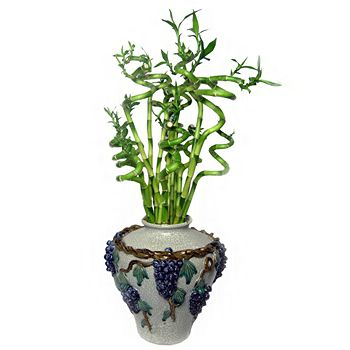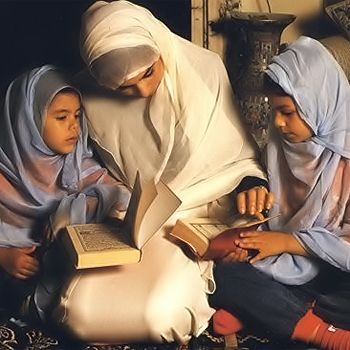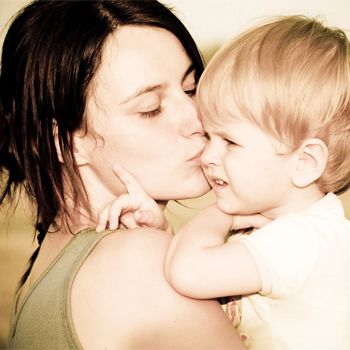Coke Studio releases its fourth episode of Season 6 featuring ‘Aamay Bhashaili Rey’ by Alamgir and Fariha Pervez, ‘Ishq Kinara, Üsküdar’a Gider Iken’ by Zoe Viccaji and Sumru Ağıryürüyen, ‘Laila O Laila’ by Rostam Mirlashari and ‘Mahi Gal’ by Asad Abbas featuring Fariha Pervez.
Turning over the pages of a story that has come to pass in our history is Alamgir’s contribution to this season of Coke Studio with the soulful Bengali folk composition ‘Aamay Bhashaili Rey’. The roots of the song are old, and has always been a source of inspiration for Alamgir reminding him of his youthful beginnings as a 14 year old boy who had come to Karachi on his own to find his passion and what would become his new home.
The song was also featured in Alamgir’s second album and he feels that the song’s enchanting quality has always connected with people irrespective of whether the language was understood. Thematically, the song is one of Struggle. It asks for the devotion and spirit to endure the toil and risk that eventually reaches the finish line of success, something that resonated with Alamgir’s struggle to keep going in the early stages of his career.
In the subtle melancholy of what is almost a lament; the song is met by Fariha Pervez’s rendition of ‘Saiyyan Bina Ghar Suna’, which speaks out on the other end on the need for companionship and the yearning for Completeness. The instrumentation of the song is used to complement and mirror the flow of emotions that transition between the vocals and carry the theme into its resolution. The overall piece is a glimpse of a bridge to the past, asking what it truly means to belong in the face of displacement and how our choices make a difference in the world today.
In connecting musical roots, Zoe Viccaji brings her version of a melody that has traveled across the globe in many forms to now be presented as ‘Ishq Kinara’. She had heard the song in its Turkish equivalent, ‘Üsküdar’a Gider İken’, and upon delving into the origin of the song, was inspired by not only the melody but the universality of its tune in the way that it has been reinvented in many different cultures across the globe.
Given the driving inspiration behind Zoe’s connection with the melody was in her Turkish experience of the song, the composition was bridged with the vocals of Sumru Ağıryürüyen bringing the traditional Turkish song to the fold lending a link to its root. Sumru states that while ‘Üsküdar’a Gider İken’ stems from the old, Anatolian neighborhood of Üsküdar in Istanbul, the Turkish version’s roots connect even further to several other countries, Bosnia, Scotland and beyond. This fact was further confirmed by members of L’Orchestra di Piazza Vittorio in Rome, Italy, who had heard versions of the same melody.
The Turkish version of the song primarily dealt with the theme of the despair caused by loss in the name of love; however Zoe, in connecting with the song personally, lyrically made her version about the idea of independence and self realization in the name of loss. ‘Ishq Kinara’ talks of the last moment of vulnerability as a relationship is severed, and looks on to being complete within one’s self after the loss. With an upbeat mixed canvas of instrumentation from Italy, Turkey, Morocco and Pakistan, the song becomes Pakistan’s version of the mysterious melody.
Upon the journey of tracing one’s roots, Coke Studio had the pleasure of connecting with music from across the border, in bridging the great tradition of Balochi music with its family across the border in Iran. In walks Rostam Mirlashari, a Balochi from Iran with his rendition of the folk song ‘Laila O Laila’, a song found in our part of Balochistan as well, demonstrating that while borders may have been put in place, cultures, traditions and heritages remain intact.
The song itself is a simple, happy, love song in the pursuit of meeting with the object of one’s love, in this case, Laila. The instrumentation is reminiscent of folklore and simpler times where music was used in the form of oral tradition, which is complemented by instruments such as the accordion as well as the Balochi Dumboora.
In connecting the elements of the music, one cannot help but notice just how instruments such as Norway’s Hardanger Fiddle, played by Anne Hytta from Rostam’s band ‘Padik’, find their place within the flow of the song indicating that the sounds that we hear across the globe are harmonious in the subtlest of ways. ‘Laila O Laila’ is a song that finds its home where there are those to connect with it. Past all borders, it begs for us to look deeper when understanding the idea of what is ours.
Opening up a trove of Sufi Folk is Asad Abbas’ ‘Mahi Gal’. Based on the raag Miyan Ki Malhar, the song is an old folk melody that Asad grew up hearing in his home given that Eastern Classical music was something he had inherited in his lineage. He feels that while the melody has always been striking, it’s within the lyrics that the song finds its mettle. The song’s dreamscape composition finds a tale at play in what could be reminiscent of folklore storytelling.
The song begins with an old, raw feel of a yearning to connect with the object of one’s love. In this dream like state, the song trails into a change of tone and witnesses glimpses of the other side, as if light at the end of the tunnel, culminating into a transition of raag by Fariha Pervez into a Tarana. And with this newfound reassurance, the song’s tone is returned to the original raag but uplifted, musically tipping into an upbeat bluesy feel with instrumental elements such as the Oud, demonstrating the passage of time over such an experience. A song with a theatrical trace, ‘Mahi Gal’ is one of intuition, reaching out to connect with the reality of a lucid dream and waking up to a new state of truth.
‘Aamay Bhashaili Rey’ – Performance Credits
Serbian House Band
Goran Antovic | Piano, Keyboards
Branko Trijic | Guitar – Acoustic and Electric
Dejan Antovic | Bass, Electric Upright
Jovan Satric | Drums
Ivana Pavlović | Harp
Jaffer Ali Zaidi | Piano
Babar Ali Khanna | Dholak
String Orchestra
I Violins
Tijana Milosević
Mirjana Nešković
Ksenija Milošević
Jelena Dimitrijević
II Violins
Selena Jakovljević
Jelena Dragnić
Tamara Zivković
Violas
Ivana Uzelac
Aleksandra Damjanović
Cellos
Julijana Marković
Uroš Zikić
Acoustic Upright
Srdjan Djordjević
‘Ishq Kinara – Üsküdar’a Gider Iken’ – Performance Credits
L’Orchestra di Piazza Vittorio
MARIO TRONCO | Italy – Artistic Director
EMANUELE BULTRINI | Italy – Guitars
PEPPE D’ARGENZIO | Italy – Sax
ERNESTO LOPEZ MATURELL | Cuba – Drums
OMAR LOPEZ VALLE | Cuba – Trumpet
PINO PECORELLI | Italy – Basses
LEANDRO PICCIONI | Italy – Piano and Keyboards
PAP YERI SAMB | Senegal – Percussion
RAUL SCEBBA | Argentina – Percussion
KAW DIALY MADI SISSOKO | Senegal – Kora
ZIAD TRABELSI | Tunisia – Oud
Babar Ali Khanna | Dholak
Göksel Baktagir | Kanun
Kamran ‘Mannu’ Zafar | Bass
Hassan El Khouni | Darbooka
Backing Vocal
Rachel Viccaji
Dhol Group
Babar Ali Khanna
Zeeshan Haider
Irfan Ali
Salman Javed
‘Laila O Laila’ – Performance Credits
Serbian House Band
Goran Antovic | Piano, Keyboards
Branko Trijic | Guitar – Acoustic and Electric
Dejan Antovic | Bass, Electric Upright
Jovan Satric | Drums
Babar Ali Khanna | Dholak
Anne Hytta | Hardanger Fiddle
Fida Baloch | Dumboora
Miloš Punišić | Accordion
Balochi Backing Vocals
Master Sheeraz Ali Sabzal
Mohammad Ali Osman Baloch
Shaukat Ali
String Orchestra
Violins
Tijana Milosević
Tea Balint
Svetlana Stančev
Predrag Žikić
Selena Jakovljević
Slavica Perić
Tamara Živković
Violas
Boris Brezovac
Aleksandra Damnjanović
Cellos
Julijana Marković
Katarina Stanković
Upright Bass
Srdjan Djordjević
Backing Vocal
Rachel Viccaji
Zoe Viccaji
‘Mahi Gal’ – Performance Credits
Serbian House Band
Goran Antovic | Piano, Keyboards
Branko Trijic | Guitar – Acoustic and Electric
Dejan Antovic | Bass, Electric Upright
Jovan Satric | Drums
Asad Ahmed | Guitar
Babar Ali Khanna | Dholak
Driss Berrada | Oud
Ivana Pavlović | Harp
Kaw Dialy Madi Sissoko | Kora
Rohail Hyatt | Acoustic Guitar
String Orchestra
I Violins
Tijana Milosević
Mirjana Nešković
Ksenija Milošević
Jelena Dimitrijević
II Violins
Selena Jakovljević
Jelena Dragnić
Tamara Zivković
Violas
Ivana Uzelac
Aleksandra Damjanović
Cellos
Julijana Marković
Uroš Zikić
Acoustic Upright
Srdjan Djordjević
Backing Vocal
Rachel Viccaji
Zoe Viccaji

